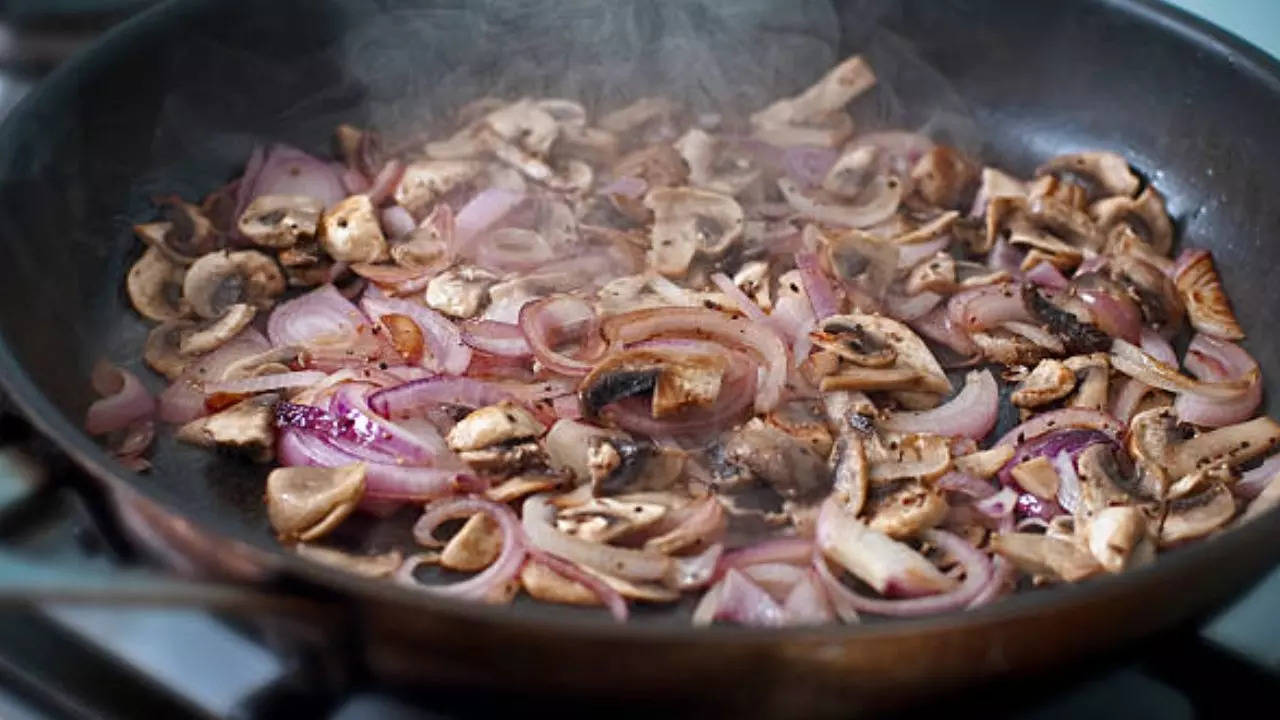-
news
-
Health
Do you think garlic and onion are always healthy? Cooking them this way can harm you
A Japanese study suggests that cooking garlic and onions at high temperatures in vegetable oil may produce harmful trans-fatty acids (TFAs), increasing the risk of heart disease. Researchers recommend cooking at lower temperatures, using stable oils, and avoiding excess heat to reduce TFA formation and protect heart health.

Do you think garlic and onion are always healthy? Cooking them this way can harm you (Image credit: iStock)
A recent study by Japanese researchers showed that cooking garlic and onions in vegetable oil at high temperatures can produce trans-fatty acids (TFAs), which are harmful. cardiovascular healthTFAs are fats that get deposited on the walls of arteries, restricting blood flow and significantly increasing the risk of heart attack.
While TFAs are commonly associated with processed foods, the study highlights that they can also form during everyday cooking practices. When unsaturated fatty acids (UFAs), which are generally considered healthy, are heated above 150 °C, they can undergo a process called trans-isomerization. This molecular change converts UFAs into TFAs, making them potentially dangerous.
Role of sulfur compounds in TFA formation
Researchers at Meijo University explored how certain sulfur-containing compounds in vegetables – such as garlic, onions, leeks and scallions – contribute to the formation of TFA. The study involved testing the effects of isothiocyanates and polysulfides (major sulfur compounds) on triacylglycerols (TAGs), which are major components of vegetable oils.
Simulating real cooking conditions, the team tested vegetables such as garlic, onions, leeks, cabbage, broccoli sprouts and horseradish in various oils, including soybean and olive oil. They found that sulfur compounds significantly promoted the heat-induced trans-isomerization of UFAs in vegetable oils, especially when the cooking temperature exceeded 140 °C.
Antioxidants provide limited protection
The researchers also evaluated the effect of antioxidants such as alpha-tocopherol on reducing UFA isomerization. While antioxidants reduced isomerization caused by isothiocyanates, they were less effective against isomerization caused by polysulfides. This suggests that cooking polysulfide-rich vegetables such as garlic and onions at high temperatures is particularly problematic.
According to the study, normal cooking conditions result in minimal TFA release, but excessive heat during cooking with sulfur-containing ingredients may increase the risk of TFA intake.
why it matters
Trans-fatty acids are a major global health concern. The World Health Organization (WHO) attributes TFA consumption to more than 278,000 deaths annually. To protect cardiovascular health, WHO recommends limiting TFA intake to less than 1 percent of daily energy intake.
Tips to do reduce tfa formation while cooking
To reduce the risk of TFA formation when cooking garlic, onions, and other sulfur-containing vegetables, consider the following tips:
– Use low temperatures for cooking: Avoid heating the oil above 140 degrees Celsius. Choose slow cooking or steaming methods to preserve nutrients and reduce harmful by-products.
– Switch to stable oils: Use oils with high heat stability, such as avocado or coconut oil, which are less prone to trans-isomerization than vegetable oils such as soybean or sunflower oil.
– Add antioxidants: Add antioxidant-rich ingredients like vitamin E (found in nuts and seeds) or herbs like rosemary to counteract the effects of isothiocyanates.
– Avoid reusing oil: Cooking oil spoils after repeated heating, which increases the chances of TFA formation. Always use fresh oil for frying or frying.
– Opt for boiling or steaming: Prepare garlic and onions by boiling or steaming instead of frying to avoid exposure to high temperatures of oil.
– Use cooking spray: Limit the amount of oil used by choosing cooking spray, which reduces oil exposure to heat while enhancing flavor.
Get the latest news live on Times Now with breaking news and top headlines from around the world.


